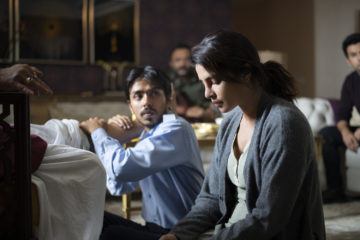Kamala Thiagarajan in NPR:

“Do we loathe our masters behind a façade of love, or do we love them behind a façade of loathing?”
This is just one of the questions that Balram Halwai, a poor, village-bred Indian boy and the central character of the movie The White Tiger, asks himself as he works as a chauffeur to a rich businessman in Delhi. The movie, newly released on Netflix, is an adaptation of the Booker Prize- winning debut novel of the same name by Indian author Aravind Adiga. Produced by Priyanka Chopra Jonas and directed by Ramin Bahrani, the film offers a grim tale of corruption and betrayal, examining the complex dynamics of the employer-servant relationships in India while delving into the country’s stark rich-poor divide and its class and caste issues. A predominant image in the movie is the rooster coop — a metaphor for the oppression of India’s poor: “The greatest thing to come out of this country … is the Rooster Coop. The roosters in the coop smell the blood from above. They see the organs of their brothers … They know they’re next. Yet they do not rebel. They do not try to get out of the coop. The very same thing is done with human beings in this country.”
…Not everyone feels the rooster coop image was an apt representation. Vaishali Shadangule, 42, founder of the fashion house Vaishali.S, left her hometown of Vidisha, about 500 miles from Mumbai, as a 17-year-old, with only the clothes on her back and the burning need to escape the limitations of a small town. Traveling ticketless on the train out of her hometown and headed for the northern Indian city of Bhopal, she had no money and no plan either. “I disliked the way the movie portrays poor people,” she says. “I thought it catered to the white Western gaze, reinforcing stereotypes that the poor are helpless.”
The overriding theme of the rooster coop in the movie is offensive and insulting, she says, because it dehumanizes poor people and implies that anyone born poor is subservient and servile.
More here.
